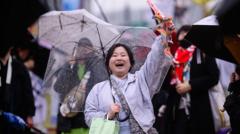The country is set to hold its presidential election on June 3, following the impeachment of President Yoon Suk Yeol over controversial martial law declarations, with political leaders positioning themselves for the upcoming electoral contest.
South Korea's Acting Leader Announces Presidential Election Date Amid Political Crisis

South Korea's Acting Leader Announces Presidential Election Date Amid Political Crisis
South Korea prepares for a crucial presidential election as acting president addresses national healing.
South Korea has officially scheduled its presidential election for June 3, as announced by acting president Han Duck-soo. This decision follows the constitutional court's confirmation of the impeachment of President Yoon Suk Yeol, who faced severe backlash after declaring martial law in December, a move that thrust the nation into a period of political instability and societal division. The court's ruling on April 4 triggered the necessity for a snap election within a two-month timeframe.
In his address to the nation, Han emphasized the urgent need for South Korea to "quickly heal from the wounds" caused by recent events, while expressing regret for the challenges faced by citizens during the four months of political uncertainty. Yoon's martial law declaration, originally justified by concerns over threats from North Korea and "anti-state forces," has drawn widespread criticism and protests across the country, leading to his eventual impeachment.
The political landscape is rapidly evolving as key figures announce their intentions to run for the presidency. Labour Minister Kim Moon-soo, who recently stepped down from his position, and Ahn Cheol-soo, a veteran lawmaker from the ruling People Power Party, are both vying for the presidency. However, the current frontrunner appears to be opposition leader Lee Jae-myung, who achieved a 34% approval rating in a recent Gallup poll, having narrowly lost to Yoon in 2022's election.
As South Korea grapples with the fallout from the political scandal, it is also facing economic challenges, particularly as it contends with a substantial 25% tariff on exports to the US imposed by President Donald Trump. The South Korean government is actively seeking negotiations to mitigate the economic impact of these tariffs.
This election will not only shape the political future of South Korea but will also reflect the nation's ongoing struggle to reconcile divisions within its society and address the immediate economic dilemmas tied to international trade relationships.



















